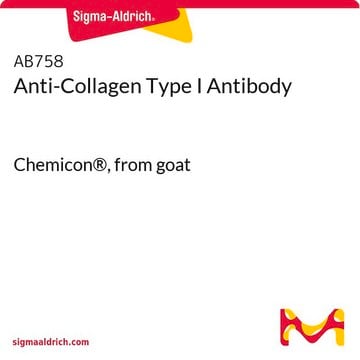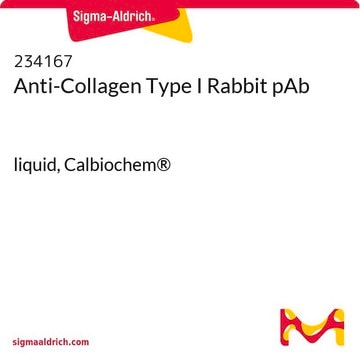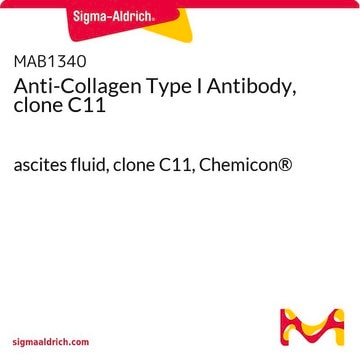SAB4200678
Anti-Collagen Type I antibody, Mouse monoclonal
clone COL-1, purified from hybridoma cell culture
Sinónimos:
Monoclonal Anti-Collagen Type I antibody produced in mouse, OI4, alpha 1, alpha 2, collagen, type I
About This Item
Productos recomendados
biological source
mouse
Quality Level
antibody form
purified immunoglobulin
antibody product type
primary antibodies
clone
COL-1, monoclonal
form
buffered aqueous solution
species reactivity
pig, rat, human, deer, bovine
concentration
~1 mg/mL
technique(s)
ELISA: suitable
dot blot: suitable
immunoblotting: 1-2 μg/mL using recombinant human collagen, expressed in Nicotiana tabacum
immunohistochemistry: 3.5-7 μg/mL using frozen sections of human tonsil, human tongue or pig tongue
isotype
IgG1
shipped in
dry ice
storage temp.
−20°C
target post-translational modification
unmodified
Gene Information
human ... COL1A1(1277)
General description
Immunogen
Application
Biochem/physiol Actions
Physical form
Disclaimer
¿No encuentra el producto adecuado?
Pruebe nuestro Herramienta de selección de productos.
Storage Class
12 - Non Combustible Liquids
wgk_germany
WGK 1
flash_point_f
Not applicable
flash_point_c
Not applicable
Certificados de análisis (COA)
Busque Certificados de análisis (COA) introduciendo el número de lote del producto. Los números de lote se encuentran en la etiqueta del producto después de las palabras «Lot» o «Batch»
¿Ya tiene este producto?
Encuentre la documentación para los productos que ha comprado recientemente en la Biblioteca de documentos.
Los clientes también vieron
Nuestro equipo de científicos tiene experiencia en todas las áreas de investigación: Ciencias de la vida, Ciencia de los materiales, Síntesis química, Cromatografía, Analítica y muchas otras.
Póngase en contacto con el Servicio técnico













